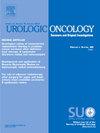Modified Glasgow prognostic score predicts outcomes of tyrosine kinase inhibitor monotherapy and immune checkpoint inhibitor combination therapy for metastatic renal cell carcinoma
IF 2.3
3区 医学
Q3 ONCOLOGY
Urologic Oncology-seminars and Original Investigations
Pub Date : 2025-08-09
DOI:10.1016/j.urolonc.2025.07.018
引用次数: 0
Abstract
Purpose
Tyrosine kinase inhibitors (TKI) and immune checkpoint inhibitors (ICI) are standard treatments for metastatic renal cell carcinoma (mRCC). the modified Glasgow prognostic score (mGPS) was suggested as one of promising biomarkers. This study evaluated the clinical utility of mGPS in patients with mRCC receiving TKI and ICI therapy and investigated the differential impact of TKI monotherapy and ICI combination therapy on treatment outcomes.
Materials and Methods
We retrospectively analyzed 265 patients with mRCC treated at Hiroshima University and its affiliated hospitals between 2007 and 2023. Patients were stratified according to mGPS (low: score 0; high: score 1, 2) and treatment modality (TKI monotherapy or ICI combination therapy). Overall survival (OS) was analyzed using the Kaplan–Meier method and multivariate Cox regression models. The clinical utility of mGPS was assessed using decision curve analysis.
Results
A high mGPS was associated with aggressive disease features and poor prognosis. Multivariate analysis identified mGPS as an independent predictor of OS (HR = 2.101, 95% CI: 1.082–4.078, P = 0.028). Its discriminative ability was comparable to that of the IMDC criteria (C-index: 0.681 vs. 0.682) while providing a superior net benefit, especially within the threshold probability range of 0.30–0.65. In the high-mGPS group, ICI combination therapy significantly improved OS compared to TKI monotherapy (median: 25.4 vs. 8.6 months, P = 0.011).
Conclusions
The mGPS effectively predicted the oncological outcomes for mRCC. In particular, it may help identify patients with high mGPS who could benefit from ICI combination therapy.
改良格拉斯哥预后评分预测转移性肾细胞癌酪氨酸激酶抑制剂单药治疗和免疫检查点抑制剂联合治疗的结果。
目的:酪氨酸激酶抑制剂(TKI)和免疫检查点抑制剂(ICI)是转移性肾细胞癌(mRCC)的标准治疗方法。改良格拉斯哥预后评分(mGPS)被认为是一种有前景的生物标志物。本研究评估了mGPS在接受TKI和ICI治疗的mRCC患者中的临床应用,并研究了TKI单药治疗和ICI联合治疗对治疗结果的不同影响。材料和方法:我们回顾性分析了2007年至2023年间在广岛大学及其附属医院治疗的265例mRCC患者。根据mGPS评分对患者进行分层(低分:0分;高:评分1、2)和治疗方式(TKI单药或ICI联合治疗)。采用Kaplan-Meier法和多变量Cox回归模型分析总生存期(OS)。采用决策曲线分析评价mGPS的临床应用价值。结果:高mGPS与侵袭性疾病特征和不良预后相关。多因素分析发现mGPS是OS的独立预测因子(HR = 2.101, 95% CI: 1.082-4.078, P = 0.028)。其判别能力与IMDC标准相当(C-index: 0.681 vs. 0.682),同时提供更优的净效益,特别是在0.30-0.65的阈值概率范围内。在高mgps组中,与TKI单药治疗相比,ICI联合治疗显著改善了OS(中位数:25.4个月vs 8.6个月,P = 0.011)。结论:mGPS能有效预测mRCC的预后。特别是,它可以帮助识别高mGPS患者,这些患者可以从ICI联合治疗中获益。
本文章由计算机程序翻译,如有差异,请以英文原文为准。
求助全文
约1分钟内获得全文
求助全文
来源期刊
CiteScore
4.80
自引率
3.70%
发文量
297
审稿时长
7.6 weeks
期刊介绍:
Urologic Oncology: Seminars and Original Investigations is the official journal of the Society of Urologic Oncology. The journal publishes practical, timely, and relevant clinical and basic science research articles which address any aspect of urologic oncology. Each issue comprises original research, news and topics, survey articles providing short commentaries on other important articles in the urologic oncology literature, and reviews including an in-depth Seminar examining a specific clinical dilemma. The journal periodically publishes supplement issues devoted to areas of current interest to the urologic oncology community. Articles published are of interest to researchers and the clinicians involved in the practice of urologic oncology including urologists, oncologists, and radiologists.

 求助内容:
求助内容: 应助结果提醒方式:
应助结果提醒方式:


